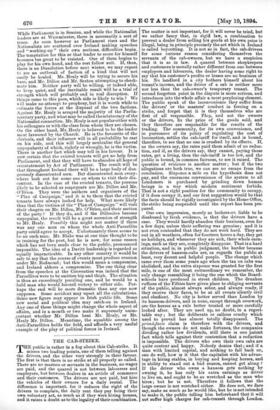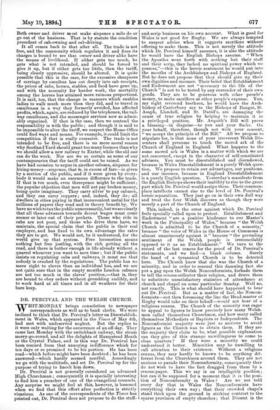THE CAB-STRIKE.
THE public is rather in a fog about this Cab-strike. It misses two leading points, one of them telling against the drivers, and the other very strongly in their favour. The first is that there is no strike at all properly so called. There are no masters or servants in the business, no wages are paid, and the quarrel is not between labourers and employers, but between dealers in an article of commerce and their customers. The drivers are not paid, but hire the vehicles of their owners for a daily rental. The difference is important, for it reduces the right of the drivers to complain, the daily rent they pay being their own voluntary act, as much as if they were hiring houses, and it raises a doubt as to the legality of their combination. The matter is not important, for it will never be tried, but we rather fancy that, in rigid law, a combination to prevent a dealer from selling his goods at his own price is illegal, being in principle precisely the act which in Ireland is called boycotting. It is not so in fact, the cab-drivers for some curious reason considering themselves the servants of the cab-owners, but we have a suspicion that it is so in law. A quarrel between shopkeepers and customers is morally rather different from one between employers and labourers, the dealer having some right to say that his customer's profits or losses are no business of his. No landlord in a city bothers himself about his tenant's income, and the driver of a cab is neither more nor less than the cab-owner's temporary tenant. The second forgotten point in the dispute is more serious, and introduces into the whole affair a most perplexing element. The public speak of the inconvenience they suffer from the drivers' or the masters' conduct in forcing on a strike, and forget that it is they themselves who are first of all responsible. They, and not the owners or the drivers, fix the price of the goods sold, and they therefore are responsible for the results of the trading. The community, for its own convenience, and in pursuance of its policy of regulating the cost of locomotion, settles the cab-tariff for itself, and is bound, therefore, to see that no one is crushed by its effects. If, as the owners say, the rates paid them admit of no reduc- tion, and if, as the drivers say, they cannot, paying those rates, get a living, then the cab-tariff is too low, and the public is bound, in common fairness, to see it raised. The question of evidence is another matter ; but if the two allegations are both true, we can see no escape from the conclusion. Sixpence a mile on the hypothesis does not pay, and the enormous convenience of the system to all Londoners is purchased by grinding down human beings in a way which modern sentiment forbids. That is not a right position for the community to occupy, if it does occupy it, and our first suggestion would be that the facts should be rigidly investigated by the Home Office, the strike being suspended until the report has been pre- pared.
Our own impression, merely as lookers-on liable to be disabused by fresh evidence, is that the drivers have a case. They would hardly abandon their business, even for a few days, unless their suffering was genuine ; and it is not even contended that they do not work hard. They are out in all weathers, often for fourteen hours a day, they get no holidays, and whenever they are sick, their whole earn- ings, such as they are, completely disappear. That is a hard situation, and is, in public judgment, the harder because the drivers of hansom-cabs are, as regards the public at least, very decent and helpful people. The change which came over them some years ago when the tax on cabs was abolished, and the extra sixpence was granted for the first mile, is one of the most extraordinary we remember, the only change resembling it being the one which the Board- schools have produced in street children. The drunken ruffians of the Fifties have given place to obliging servants of the public, almost always sober, and always ready, if they receive their fares, to be at all events silently civil and obedient. No city is better served than London by its hansom-drivers, and in none, except through overwork, are the horses as a rule better treated or more carefully looked after. They are used up, no doubt, in a regret- table way ; but the deliberate or callous cruelty which used to prevail has almost totally disappeared. The prirad-facie claim is therefore with the drivers, and though the owners do not make fortunes, the companies dividing rather low dividends, still there is one patent fact which tells against their contention that a reduction is impossible. The drivers who own their own cabs are quite content and happy. Nobody denies that; and if a man with limited capital, and nothing to fall back or, can do well, how is it that the capitalist with his advan- tage in hiring stables, in buying and keeping horses, and in ability to stand out a bad season, cannot get along? If the driver who owns a hansom gets nothing by owning it, he has only his extra earnings as driver to live on, and ought to be as wretched as the man who hires ; but he is not. Therefore it follows that the large owner is not wretched either. He does not, we dare say, make as much as he would like, but he is not intended to make it, the public telling him beforehand that it will not suffer high charges for cab-transit through London. Both owner and driver must make sixpence a mile do or go out of the business. That is by statute the condition precedent of cab-owning and cab-driving. It all comes back to that after all. The trade is not free, and the community which regulates it and fixes its charges is bound to see that owner and driver alike have the means of livelihood. If either gets too much, he gets what is not intended, and should be forced to give it up, but if either gets too little, then the tariff, being clearly oppressive, should be altered. It is quite possible that this is the case, for the excessive cheapness of carriage by omnibus has cut deeply into cab receipts, the prices of cabs, horses, stables, and food have gone up, and with the necessity for harder work, the mortality among the horses has attained more ruinous proportions. It is said, too, that the change in manners which enables ladies to walk much more than they did, and to travel in omnibuses in a way they formerly avoided, has affected profits, which, again, are reduced by the telephones, the rail- way omnibuses, and the messenger services now so admir- ably organised. If that is the case, then we contend the responsibility is with the public ; and though it is said to be impossible to alter the tariff, we suspect the Home Office could find ways and means. For example, it could limit the competition if that is really excessive. The trade is not intended to be free, and there is no more moral reason why Scotland Yard should grant too many licences than why we should allow a new railway to Exeter, while the old one can do the work. Nor are we so certain as some of our contemporaries that the tariff could not be raised. As we have had occasion to argue in another column, sixpence for hiring-money—sixpence, that is, in excess of fare—is given by a section of the public, and if it were given by every- body it would make an enormous difference to the trade. If that is too much, even threepence might be sufficient ; the popular objection that men will not pay broken money, being quite imaginary. They carry silver to pay cabmen, and they can carry coppers ; and, indeed, they do ; all dwellers in cities paying in that inconvenient metal for the millions of papers they read and in theory benefit by. We have no wish to tax the public unnecessarily, but we see clearly that all these advances towards decent wages must come sooner or later out of their pockets. Those who ride in cabs are not poor, and those who drive them have, we maintain, the special claim that the public is their real employer, and has fixed to its own advantage the rates they are to get. We would not, be it understood, for the world give up that system. Free locomotion means nothing but free jostling, with the rich getting all the road, and there is bother enough in life already without a quarrel whenever you want to save time ; but if the public insists on regulating cabs and railways, it must see that nobody is crushed by the regulations. The public has no more right to slaves than an individual has, and we are not quite sure that in the empty months London cabmen are not too much in the slaves' position,—that is, they are bound to obey orders without grumbling audibly, and to work hard at all times and in all weathers for their bare keep.







































 Previous page
Previous page